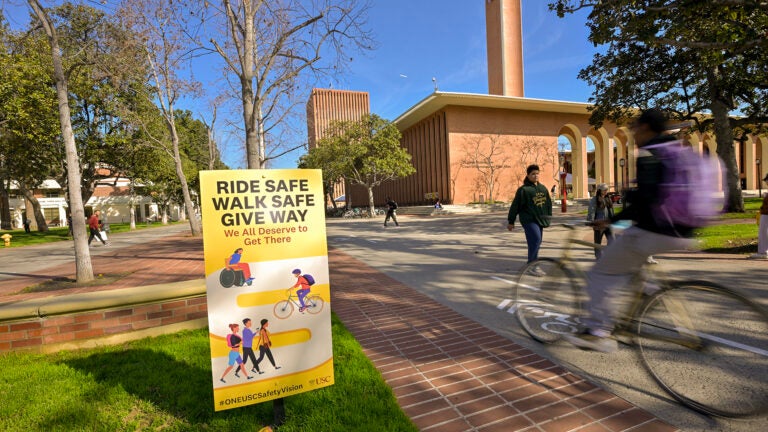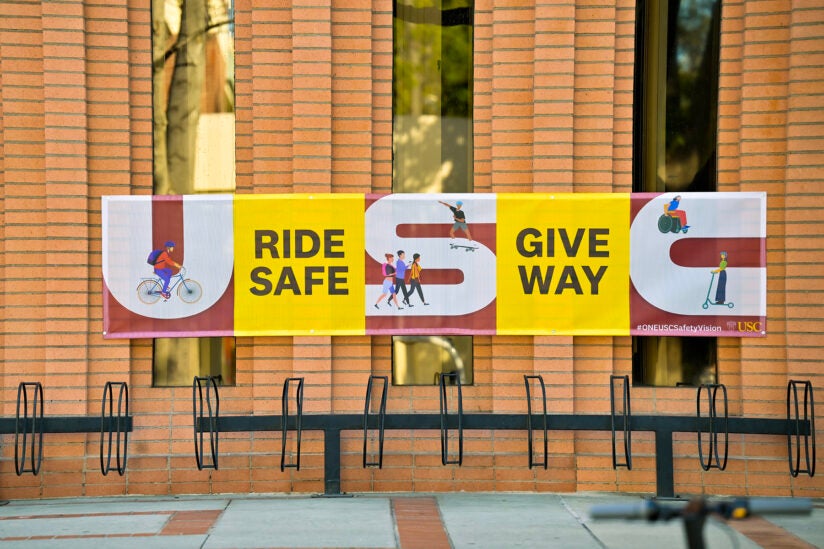
The safety campaign was created by USC Annenberg School for Communication and Journalism students. (USC Photo/Gus Ruelas)
New pedestrian safety campaign encourages Trojans to look out for one another
Student-driven campaign is part of the university’s ONE USC Safety Vision, which aims to create a safe and inclusive environment for all members of the USC community.
USC senior Spencer St.Denis remembers slamming on his brakes as he exited the Downey Way parking structure after a fellow student ran in front of his car. Paulene Ng Chee, a junior, remembers nearly getting hit by a fellow student who was on his phone while riding a skateboard. Likewise, graduate student Monique Chavez has witnessed countless close calls and collisions between students and mobility devices like bikes and e-scooters on her commute to campus.
These experiences and other near misses prompted the three USC Annenberg School for Communication and Journalism students to create a safety campaign with a simple message: “We all deserve to get there.” The campaign encourages fellow Trojans to look out for one another while moving through campus.

“Everyone who worked on this project said they’ve either seen two students crash right before their eyes, somebody fly off a scooter or something like that,” Chavez said.
“We’ve all had experiences, and if this is just us random students then I’m sure it happens even more often.”
USC pedestrian safety campaign: thousands of bikes
There are an estimated 9,000 to 15,000 bikes — not including self-powered and electric mobility devices like skateboards and scooters — on both the University Park and Health Sciences campuses daily, according to the campaign. Last year alone, USC’s Department of Public Safety responded to 157 traffic collisions involving mobility devices; of those, 99% were on the University Park Campus. The bulk of the collisions involved e-scooters, followed by skateboards, e-carts and bicycles.
“This is sort of a new phenomenon with e-scooters and just the number of people going to college,” St.Denis said. “We’re all kind of in this condensed space, and you don’t always take into consideration how tight some of the walkways between structures are.”
As part of the university’s ONE USC Safety Vision, which aims to create a safe and inclusive environment for all members of the Trojan Family, USC administration partnered with the USC Annenberg students to create a message and social media campaign that would resonate with students.
It was really important to have [students] lead this effort because they’re the largest demographic affected.
Erroll Southers, USC associate vice president
Erroll Southers — USC’s associate senior vice president, safety and risk assurance — said that in meetings with students he learned that a mass email to the Trojan Family announcing the campaign was not quite the right medium for the intended audience.
“They said to me, ‘You know, Dr. Southers, we don’t read email.’ And I said, ‘OK, how would you communicate with your peers?’” Southers said.
“So, it was really important to have them lead this effort because they’re the largest demographic affected.”
This was one of the aspects of the campaign that Chavez appreciated most.
‘Community-minded’ focus for USC pedestrian safety campaign
“I think community-minded is the best way to describe it,” Chavez said. “This isn’t a message coming down from administration — it’s truly a student voice.”
The students began working with USC Annenberg Assistant Dean for Student Affairs Suzanne Alcantara and adjunct instructor Andy Keown last summer to craft an awareness campaign that would resonate with students. After months of development, the team created signs to be placed around campus with messages such as “Ride safe,” “Walk safe” and “Give way.” The signs were installed on campus earlier this month, and group members launched a social media campaign around the same time.
Rather than outright banning mobility devices, the group — consisting of Chavez, St.Denis, Ng Chee and their USC Annenberg classmate Kameron Lewis — wanted to push a message of consideration and empathy. The group knows that sentiment will remain relevant with every new class of students and every new mobility device available.
It’s kind of an ‘it takes all of us’ kind of campaign.
Spencer St.Denis, USC senior
“It’s kind of an ‘it takes all of us’ kind of campaign,” St.Denis said. “There are going to be more scooters and ways to get around campus going forward, so if students are able to advocate for this message now, then it can continue.”
While the rest of the group is set to graduate this spring, Ng Chee has another year of commuting around the University Park Campus. This time next year, she hopes to see the campaign message still resonating with students — that even on a busy campus, commutes don’t have to come at the expense of others’ safety.
“The main message I wanted to convey when I started working on this project is that everyone’s trying to get somewhere,” Ng Chee said. “Even as I sit here and look at students walking by, they all have their destinations they’re trying to reach, and they shouldn’t have to be in harm’s way while trying to do so.”



